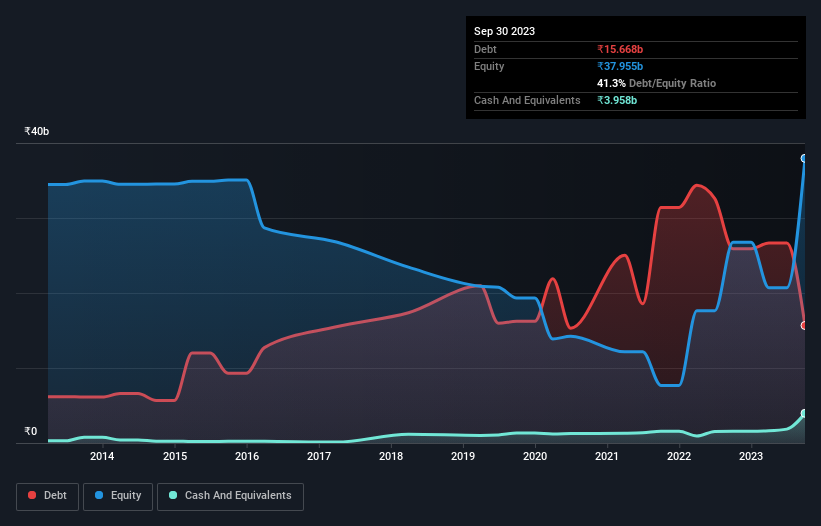Some say volatility, rather than debt, is the best way to think about risk as an investor, but Warren Buffett famously said that 'Volatility is far from synonymous with risk.' So it seems the smart money knows that debt - which is usually involved in bankruptcies - is a very important factor, when you assess how risky a company is. Importantly, D B Realty Limited (NSE:DBREALTY) does carry debt. But is this debt a concern to shareholders?
What Risk Does Debt Bring?
Generally speaking, debt only becomes a real problem when a company can't easily pay it off, either by raising capital or with its own cash flow. If things get really bad, the lenders can take control of the business. While that is not too common, we often do see indebted companies permanently diluting shareholders because lenders force them to raise capital at a distressed price. Of course, debt can be an important tool in businesses, particularly capital heavy businesses. When we think about a company's use of debt, we first look at cash and debt together.
Check out our latest analysis for D B Realty
What Is D B Realty's Debt?
You can click the graphic below for the historical numbers, but it shows that D B Realty had ₹15.7b of debt in September 2023, down from ₹25.9b, one year before. However, it does have ₹3.96b in cash offsetting this, leading to net debt of about ₹11.7b.

How Healthy Is D B Realty's Balance Sheet?
The latest balance sheet data shows that D B Realty had liabilities of ₹51.4b due within a year, and liabilities of ₹15.8b falling due after that. On the other hand, it had cash of ₹3.96b and ₹4.96b worth of receivables due within a year. So its liabilities total ₹58.3b more than the combination of its cash and short-term receivables.
While this might seem like a lot, it is not so bad since D B Realty has a market capitalization of ₹98.5b, and so it could probably strengthen its balance sheet by raising capital if it needed to. But it's clear that we should definitely closely examine whether it can manage its debt without dilution. There's no doubt that we learn most about debt from the balance sheet. But it is D B Realty's earnings that will influence how the balance sheet holds up in the future. So if you're keen to discover more about its earnings, it might be worth checking out this graph of its long term earnings trend.
Over 12 months, D B Realty reported revenue of ₹7.5b, which is a gain of 240%, although it did not report any earnings before interest and tax. When it comes to revenue growth, that's like nailing the game winning 3-pointer!
Caveat Emptor
Even though D B Realty managed to grow its top line quite deftly, the cold hard truth is that it is losing money on the EBIT line. Indeed, it lost ₹6.2b at the EBIT level. When we look at that and recall the liabilities on its balance sheet, relative to cash, it seems unwise to us for the company to have any debt. Quite frankly we think the balance sheet is far from match-fit, although it could be improved with time. Surprisingly, we note that it actually reported positive free cash flow of ₹3.1b and a profit of ₹1.9b. So one might argue that there's still a chance it can get things on the right track. The balance sheet is clearly the area to focus on when you are analysing debt. But ultimately, every company can contain risks that exist outside of the balance sheet. These risks can be hard to spot. Every company has them, and we've spotted 5 warning signs for D B Realty you should know about.
If you're interested in investing in businesses that can grow profits without the burden of debt, then check out this free list of growing businesses that have net cash on the balance sheet.
New: Manage All Your Stock Portfolios in One Place
We've created the ultimate portfolio companion for stock investors, and it's free.
• Connect an unlimited number of Portfolios and see your total in one currency
• Be alerted to new Warning Signs or Risks via email or mobile
• Track the Fair Value of your stocks
Have feedback on this article? Concerned about the content? Get in touch with us directly. Alternatively, email editorial-team (at) simplywallst.com.
This article by Simply Wall St is general in nature. We provide commentary based on historical data and analyst forecasts only using an unbiased methodology and our articles are not intended to be financial advice. It does not constitute a recommendation to buy or sell any stock, and does not take account of your objectives, or your financial situation. We aim to bring you long-term focused analysis driven by fundamental data. Note that our analysis may not factor in the latest price-sensitive company announcements or qualitative material. Simply Wall St has no position in any stocks mentioned.
About NSEI:DBREALTY
Valor Estate
Operates as a real estate construction and development company in India.
Excellent balance sheet and slightly overvalued.
Similar Companies
Market Insights
Community Narratives



